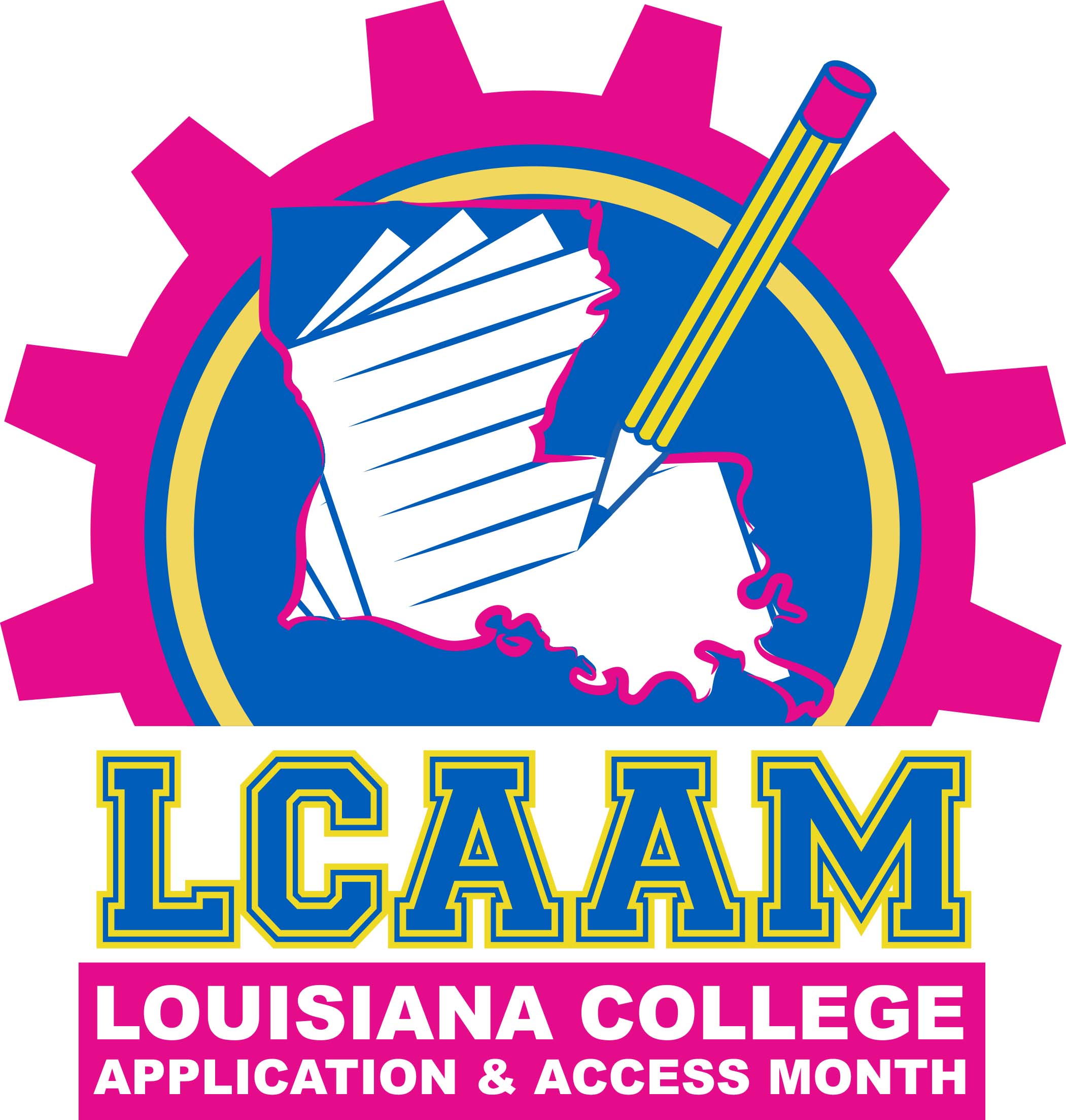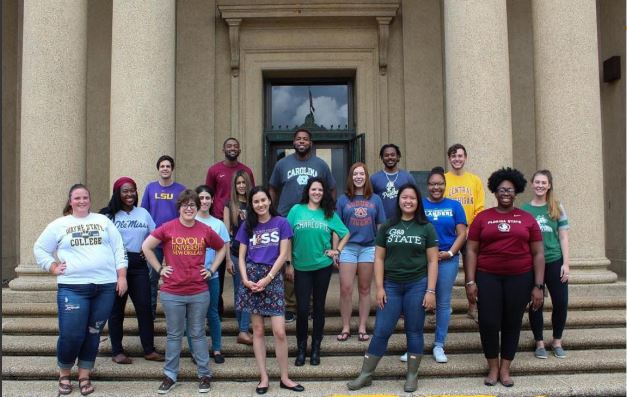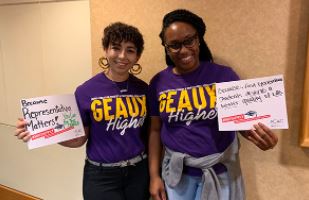September 2020
Improving Access to Higher Education: Initiatives to Help More Students Geaux to College
September 14, 2020
As we start the fall semester, incoming students are beginning their journey at higher education institutions all over the United States. Simultaneously, college admissions offices and high school seniors are already thinking about next fall, as a new cycle of the college admissions process begins. The process of enrolling in college involves numerous steps, many of which begin well before entering college. In this article, we explore both why and how to "geaux" to college. For our readers beyond the great state of Louisiana, "geaux" is our Cajun French word play on the verb "go".
Historically, many populations were excluded from attending colleges and universities,
including women, People of Color, religious minorities, and others. Higher education
was originally not open to the larger public and was reserved for the elite. Many
of the first colleges in the United States were private institutions, and it was not
until the mid-1800s that we saw an uprise in public college education. Now, there
are more than 4,000 degree-granting institutions in the United States serving over
20 million college students. Below I highlight three public institutional systems
that were established with a focus on providing more students with access to college:
- Community Colleges: Originally referred to as junior colleges, providing access has always been a key tenet of these institutions. There are now more than 1,000 community colleges in the U.S. and approximately, one in three (33%) of undergraduate students are enrolled at public community colleges.
- Historically Black Colleges/Universities (HBCUs): These institutions were established during segregation, to provide access to higher education for Black Americans. There are 101 HBCUs in the United States (most are in the south), and these institutions enroll students of all races and ethnicities. To learn more about the rich history and mission of HBCUs, watch the documentary Tell Them We Are Rising.
- Land-Grant Universities: The most influential piece of legislation in the development of public higher education, was the First Morrill Act of 1862, which established a land-grant university in each state (Louisiana State University is the 1862 land-grant institution in LA). The Second Morrill Act of 1890 established 19 Historically Black Colleges/Universities (Southern University is the 1890 land-grant institution in LA). More recently, the Third Morrill Act of 1994 gave land-grant status to more than 30 Tribal Colleges. Land-grant institutions were established with a focus on Agriculture and Mechanic Arts (engineering), which is often referred to as A&M.
ACCESS: Historically, many populations were excluded from attending colleges and universities, including women, People of Color, religious minorities, and others...now, there are more than 4,000 degree-granting institutions in the United States serving over 20 million college students.
Louisiana: Postsecondary Attainment Rates
Only 32.1% of working-age individuals (25-64 years old) have earned an associate degree or higher in Louisiana, which lags behind the national rate of 43.2% (Lumina, 2020). Further, only 25% of Louisiana residents have earned a bachelor’s degree or higher, compared to 33.9% of U.S. residents. Put simply, one in four Louisianans have at least a bachelor’s degree, whereas one in three Americans have at least a bachelor’s degree.
Put simply, one in four Louisianans have at least a bachelor’s degree, whereas one in three Americans have at least a bachelor’s degree.
Notably, Louisiana residents ages 25-64 earn short-term credentials (certificates and certifications) at almost twice the rate of the U.S. population, 15.2% compared to 8.1%, respectively. With the inclusion of workforce certificates (beginning in 2014) and certifications (in 2018), Louisiana’s current postsecondary attainment rate is 47.3%. The state of Louisiana has a goal of raising the postsecondary attainment rate to 60% by 2030. In order to accomplish this, Louisiana will need to continue to provide the current postsecondary opportunities, but also increase both the number of students enrolled in and graduating from institutions of higher education.
One of the largest educational equity gaps in Louisiana is the postsecondary attainment rate for African Americans. Compared to all other states in the U.S., Louisiana has the lowest postsecondary attainment rate for African Americans. Only 21% of African Americans in Louisiana have earned at least an associate degree, whereas 32% of African Americans in the nation have earned at least an associate degree. It is imperative that Louisiana focuses on these gaps in order to address economic and social inequity.
Louisiana #s at a Glance

32.1% | Louisianans with associate degree or higher (national rate: 43.2%)

25% | Louisianans with bachelor's degree or higher (national rate: 33.9%)

1 in 4 | Louisianans with bachelor's degree (national rate: 1 in 3)

15.2% | Louisianans with certificate and/or certification (national rate: 8.1%)

47.3% | Louisiana's postsecondary attainment rate (includes certificates and certifications)

21.3% | African Americans in Louisiana with an associate degree or higher (national rate: 31.6%)
Compared to all other states in the U.S., Louisiana has the lowest postsecondary attainment rate for African Americans...it is imperative that Louisiana focuses on these gaps in order to address economic and social inequity.
Louisiana: College Opportunities
Louisiana is unique in that we have four systems of public higher education, more than most states. With four systems of higher education, Louisiana is able to provide diverse college opportunities for its citizens. Finding the right fit is important to all entering students, who consider numerous factors when choosing a college. Here is a brief overview of the four public systems:
- Louisiana Community and Technical College System (LCTCS): Founded in 1999, LCTCS includes 12 two-year colleges throughout the state of Louisiana.
- Louisiana State University (LSU) System: In addition to the Flagship campus in Baton Rouge, the LSU system has 8 entities, including institutions in Alexandria, Eunice, Shreveport, and New Orleans.
- Southern University (SU) System: The only HBCU system in the nation, the SU System has campuses in Baton Rouge, New Orleans, and Shreveport.
- University of Louisiana System: this system includes 9 distinctive educational institutions, such as Grambling State University and University of Louisiana at Lafayette.
In addition to the four public university systems, there are also 10 private colleges in the state, such as Dillard University and Tulane University.
Why Geaux to College? Benefits of a College Degree
“By 2025, 60 percent of Americans will need some type of high-quality credential beyond high school” (Lumina, 2020). More than half of the jobs in Louisiana require more than a high school diploma and among the 83 5-star jobs as identified by the Louisiana Workforce Commission, 78% of the jobs require at least an associate degree. While there are a lot of great job opportunities in Louisiana that do not require a bachelor’s degree, earning a postsecondary degree consistently shows great promise for social mobility.
Investments in higher education, a form of human capital, have benefits for both the individual and society at large. There is a long-standing debate about whether education is a private or public good.
Investments in higher education, a form of human capital, have benefits for both the individual and society at large. There is a long-standing debate about whether education is a private or public good. Most people are aware of the private (individual) benefits of education, such as increased knowledge and labor market outcomes (e.g., employment and higher salary). On average, bachelor’s degree recipients (with no advanced degree) earned about $25,000 more than high school graduates in 2018. Overall, individuals with higher levels of education are more likely to be employed, earn more, and contribute more in taxes.
Notably, there are also numerous public benefits of postsecondary education. For example, college educated individuals have higher rates of volunteerism and voting, and also have healthier lifestyles. Among 25-34 year-olds, 69% of individuals with at least a bachelor’s degree exercise weekly, compared to 47% of high school graduates. Among adults over the age of 25, 42% of individuals with a bachelor’s degree and 52% of individuals with a an advanced degree volunteer, which is double the rate of those with a high school diploma (19%). Importantly, individuals with higher levels of education, have higher voting rates. In the 2016 presidential election, 76% of individuals with at least a bachelor’s degree voted compared to only 52% of high school graduates.

There are many ways for you personally and/or your organization to support college access. September 18 is #WhyApplyDay and October is Louisiana College Application and Access Month.
How Can I Help More Students Geaux to College?
#WhyApply Day: Friday, September 18, 2020
To kick off college application season, the American College Application Campaign (ACAC) encourages everyone to participate in #WhyApply (to college) Day on September 18, 2020. Wear your college gear (t-shirt, hats, pins, etc.) and share on social media why you believe students should apply to college and/or why you applied to college. Be sure to use the #WhyApply hashtag and tag @LOSFA and @American_cac in your post. You can also use the #WhyApply template (check out Downloadable Resources at the bottom of the page) and post a photo of you holding it.
Louisiana College Application and Access Month (LCAAM): October
While seemingly a small task, applying to college is a complex process and can pose a potential barrier to college enrollment. The Louisiana Office of Student Financial Assistance (LOFSA) sponsors the LCAAM initiative each October. LCAAM is part of the larger American College Application Campaign (ACAC), a national effort “to assist high school seniors as they navigate the college application and admissions process and ensure each participating student submits at least one admissions application” (ACT Center for Equity in Learning, 2020).
More than 70 high schools in Louisiana participate in LCAAM each year. High schools that are interested in participating can email the program coordinators at [email protected].
 In addition to applying directly to a college/university, students can apply to multiple
colleges through consolidated college application platforms such as:
In addition to applying directly to a college/university, students can apply to multiple
colleges through consolidated college application platforms such as:
College Preparatory Programs
There are numerous programs and initiatives focused on increasing college access for underrepresented student populations. Some Louisiana initiatives are more than 50 years old while others are much more recent.
- Baton Rouge Youth Coalition (BRYC) “prepares high-achieving, under-resourced high school students to enter, excel in, and graduate from college so they can become full participants in society.” There are a number of volunteer opportunities with BRYC. The LSU Higher Ed program also partners with BRYC.
- GEAR UP is a federally-funded program that provides grants to states or institutions, to create partnerships with high poverty middle or high schools. The goal of the program is to increase the number of low-income students who enroll and succeed in higher education. Louisiana has a state-wide GEAR UP grant that partners with 16 districts and a grant in Lafayette that partners with 4 local high schools.
- TRIO Programs (funded by the U.S. Department of Education) are “targeted to serve and assist low-income individuals, first-generation college students, and individuals with disabilities to progress through the academic pipeline from middle school to postbaccalaureate programs.” Upward Bound, Talent Search, and Student Support Services were created in the 1960s as the original “TRIO,” and now there are now eight TRIO programs. There are Upward Bound programs at Baton Rouge Community College, LSU, and Southern University.

More Opportunities to Enroll and Re-Enroll in College
There are also great opportunities for individuals who are interested in going to college or going back to college, but are not enrolling directly from high school.
- Five for Six is a scholarship program through LCTCS that provides individuals without a high school diploma with a path towards college, a credential, and a high-wage, high-demand career. All 12 colleges comprising the LCTCS set aside 5% of tuition revenue to fund the cost of six college credit hours for students without a high school diploma. After students completed six credit hours, they become eligible to apply for federal financial aid. Importantly, students simultaneously continue to work towards their high school equivalency credential by passing the HiSET® (High School Equivalent Test).
- Compete LA is a program sponsored by the University of Louisiana System, designed for students who started college but did not complete their degree. Louisiana residents with some college credit who have been out of college for at least two years are eligible. After submitting an application, students are matched with a personal coach that helps them choose a degree program and guides them through the re-enrollment process. Compete LA students pay a flat rate of $275 per credit hour and no fees.
College Financing 101
- The Louisiana Office of Student Financial Assistance (LOSFA) is a program of the Louisiana Board of Regents, that “strives to be Louisiana’s first choice for college access; by promoting, preparing for and providing equity of college access.” LOSFA administers Louisiana’s scholarship and grants programs, and helps assist students in finding money for college. LOFSA staff are available for virtual office hours.
- The Free Application for Federal Student Aid (FAFSA) is the most important form to complete to apply for financial aid. The FAFSA determines applicants’ Expected Family Contribution (EFC). Each college has a Cost of Attendance (COA), which is how much it will cost a student to go to school per year (tuition, fees, room, board, etc.). Colleges determine your financial need by using this formula: COA - EFC = Financial Need. If a student has significant Financial Need, they will likely receive need-based aid (e.g., Pell Grant, subsidized loans, work study, etc.). Starting in 2018, Louisiana required graduating high school seniors to complete the FAFSA, which led to the highest FAFSA completion rates in the nation.
- Louisiana’s Taylor Opportunity Program for Students (TOPS) is a comprehensive program of state scholarships for Louisiana residents. Student’s eligibility for one of the four TOPS award components is based on high school GPA and ACT score (or SAT equivalent).
- UNCF is the nation’s largest private scholarship provider to minority group members.
Starting in 2018, Louisiana required graduating high school seniors to complete the FAFSA, which led to the highest FAFSA completion rates in the nation.
Learn More
Below are some articles and chapters I wrote related to college access and enrollment:
- Clayton, A. B. (2019). Helping students navigate the college choice process: The experiences and practices of college advising professionals in public high schools. The Review of Higher Education, 42(4), 1401-1429.
- Clayton, A. B. and Godfrey, J. F. (2019 [Review of the book Measuring success: Testing, grades, and the future of college admissions, by J. Buckley, L. Letukas, & B. Wildavsky]. The Review of Higher Education, 49(2), E17-E20.
- Clayton, A. B., & Means, D. R. (2018). Access granted? Challenges, controversies, and opportunities around college access in American higher education. In J. L. Blanchard (Ed.), Controversies on campus: Debating the issues confronting American universities in the 21st century (pp. 22-43). Praeger.
- Clayton, A. B., & Peters, B. A. (2019). The desegregation of land-grant institutions in the 1950s: The first African American students at NC State University and Virginia Tech. The Journal of Negro Education, 88(1), 75-92.
- Clayton, A. B., & Umbach, P. D. (in press). Making it free and easy: Exploring the effects of North Carolina College Application Week on college access. The Review of Higher Education.
- Godfrey, J. F., Brown, A. M., Hubbard, R. E., & Clayton, A. B. (2020). Posh pipeline: Gaining college admission at any cost. Journal of Cases in Educational Leadership.
- Means, D. R., Clayton, A. B., Conzelmann, J. G., Baynes, P., & Umbach, P. D. (2016). Bounded aspirations: Rural, African American high school students and college access. The Review of Higher Education, 39(4), 543-569.
- Toutkoushian, R. K., May-Trifiletti, J. A., & Clayton, A. B. (2019). From “first in family” to “first to finish”: Does college graduation vary by how first-generation college status is defined? Educational Policy.
- Whatley, M. E., & Clayton, A. B. (2020). Study abroad for low-income students: The relationship between need-based aid and access to education abroad. Journal of Student Financial Aid, 49(2), 1-27.
Written by: Ashley Clayton, PhD
Ashley B. Clayton, PhD is the Jo Ellen Levy Yates Endowed Assistant Professor in the Higher Education program at Louisiana State University. She earned her bachelor’s degree from Virginia Tech and her master’s degree from Florida International University. Dr. Clayton earned her PhD in Educational Research and Policy Analysis (Higher Education) at North Carolina State University and completed her postdoctoral appointment at the University of Georgia's Institute of Higher Education. Prior to becoming a faculty member, she worked in undergraduate admissions and TRIO Upward Bound.
Dr. Clayton’s research agenda broadly focuses on practices and policies that address postsecondary access, equity, and success. She examines the barriers, systems, and policies that aid or inhibit postsecondary access and success. Her work often examines postsecondary outcomes for underserved student populations, including first-generation college students, low-income students, rural students, and Students of Color. Several of her research projects examine college access interventions, college advising, K-16 pathways, and the postsecondary experiences of underrepresented students. A central tenet of her research agenda is a commitment to scholarship that focuses on equity and diversity.
 To kick off college application season, the American College Application Campaign
(ACAC) encourages everyone to participate in #WhyApply (to college) Day on September
18, 2020.
To kick off college application season, the American College Application Campaign
(ACAC) encourages everyone to participate in #WhyApply (to college) Day on September
18, 2020.